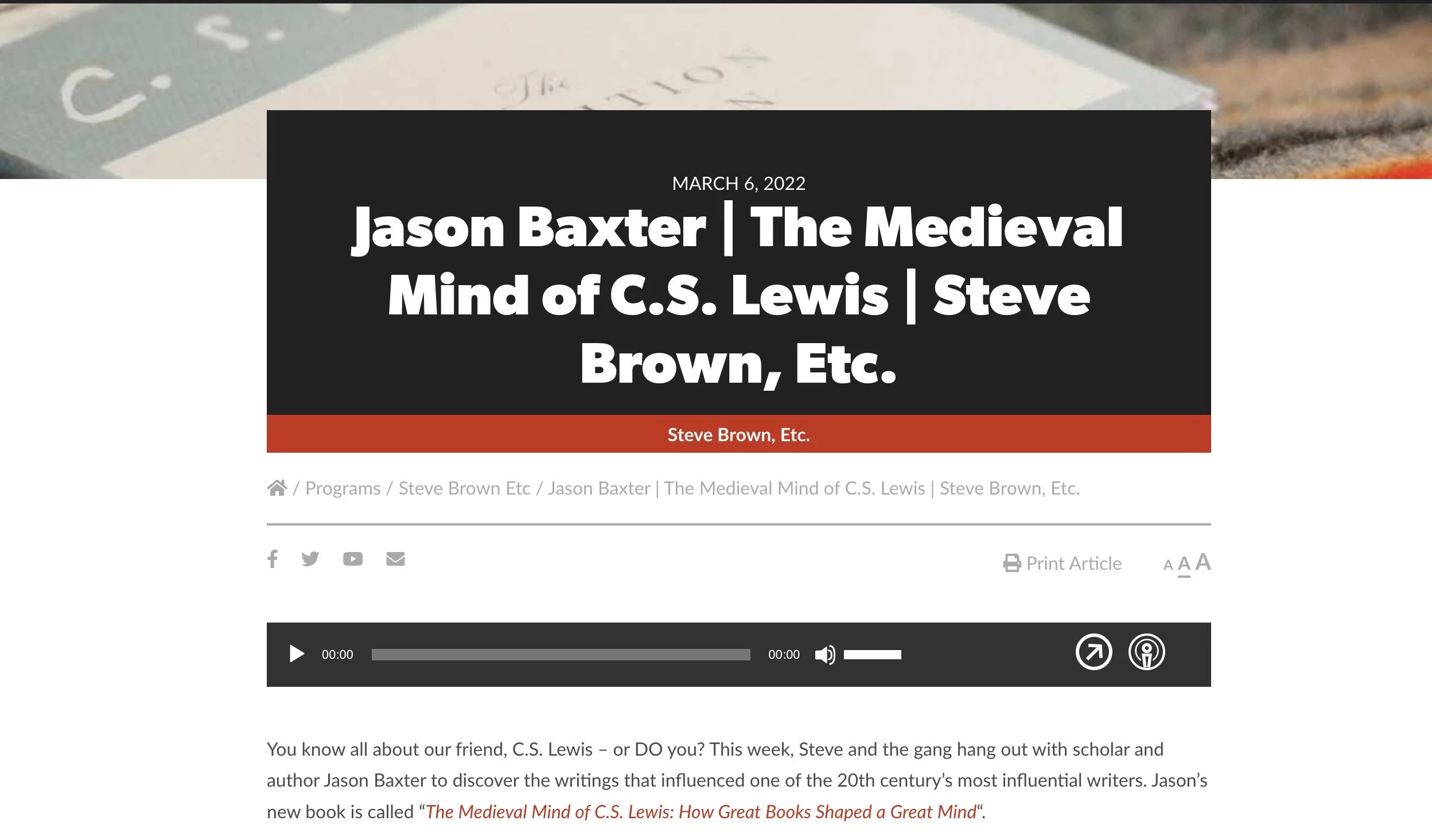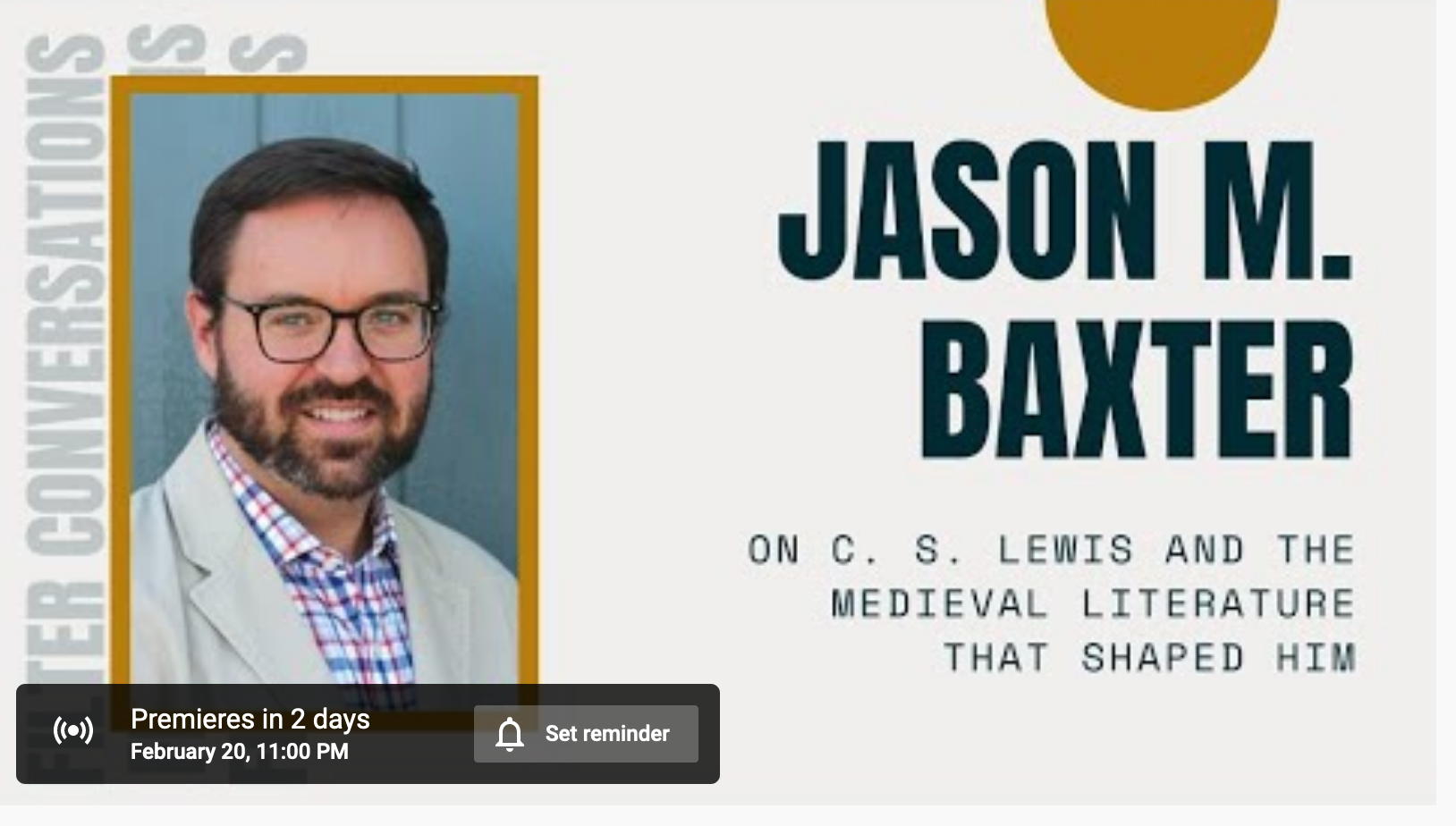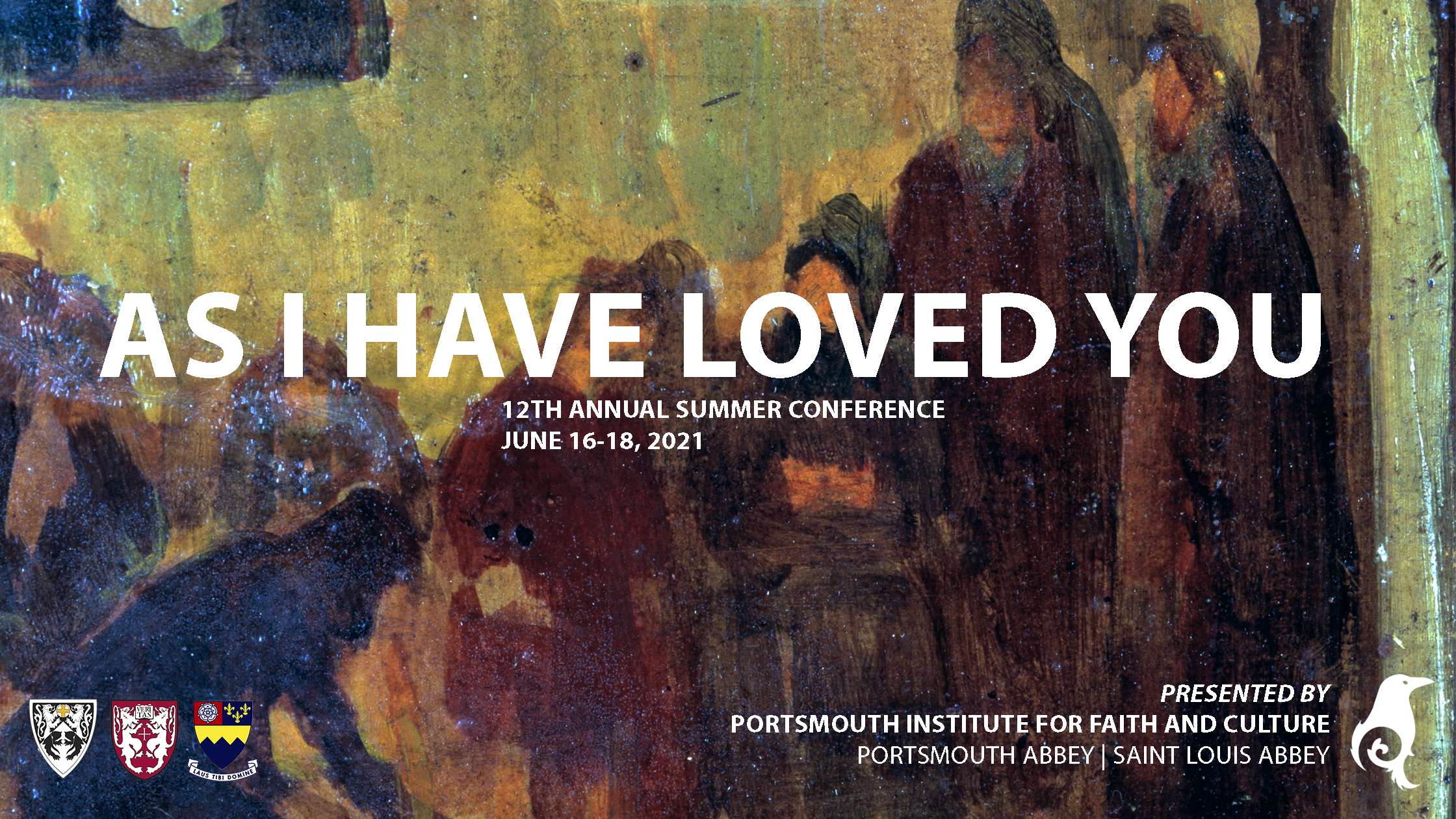Select Media Appearances
A Conversation with Jason Baxter
Angelina Stanford, Thomas Banks, and Cindy Rollins talk to me about literature, the relevance of medieval cosmology, and Lewis. We become instant friends. Here’s a description of the show:
On The Literary Life Podcast this week, our hosts Angelina Stanford, Cindy Rollins, and Thomas Banks sit down for a special conversation with Jason Baxter, author of The Medieval Mind of C. S. Lewis. Jason is a speaker, writer, and college professor who writes primarily on medieval thought and is especially interested in Lewis’ ideas. You can find out more about him and his books at JasonMBaxter.com.
Our hosts and Jason discuss a wide range of ideas, including the values of literature, the sacramental view of reality, why it is important to understand medieval thought, the “problem” of paganism in Lewis’ writings, and how to approach reading ancient and medieval literature.
• DONALD KRAYBILL on how the Amish "negotiate" with modernity as communities by making decisions about the uses of technology
• THADDEUS KOZINSKI on the dubious claim within liberalism that public life can be well-ordered by entirely neutral (non-transcendent) principles
• DAVID BENTLEY HART on how "two-tier Thomism" deviates from historic Christian understanding of the relationship between God and Creation
• NIGEL BIGGAR on recognizing problems with the notion of "natural rights," without denying the importance of rights understood as granted within social and political contexts
• RAVI SCOTT JAIN on reconfiguring science and the teaching of science within the framework of natural philosophy, natural history, and natural science
• JASON BAXTER on how C. S. Lewis’s imagination was shaped by texts from the Middle Ages
“The latest installment of an ongoing interview series with contributing editor Mark Bauerlein. Jason M. Baxter joins the podcast to discuss his recently published book, An Introduction to Christian Mysticism: Recovering the Wildness of Spiritual Life.”
Interview with Austin @
Gospel Simplicity
“Great Books and the Love of Learning: The Medieval Mind of CS Lewis (w/ Dr. Jason Baxter)”
March 2o22: Steve Brown and Michael Jahosky interviewed me about Medieval Mind.
Two very different styles of interviewing!
Filter:Biblical Clarity in a Confusing World
Aaron Shamp interviewed me about the new Lewis book in February 2022.
Portsmouth Institute for Faith and Culture
“Technology and Christian Love”
Selected Podcast Interviews on Beginner’s Guide to Dante’s Comedy
A Beginner's Guide to Dante (featuring Jason Baxter).
In this episode, David Kern chats with Jason Baxter, a professor and writer from Wyoming Catholic College, about his new books, A Beginner's Guide to Dante's Divine Comedy. This seeks to help "readers better appreciate and understand the complexity and layers of meaning of Dante's spiritual masterpiece." Topics of conversation include the challenges of teaching Dante today, Dante's modern moment, why the Divine Comedy is worth loving, and much more..
“I think Dante would have been heartbroken to know that we get more excited about his mud pit fights in Inferno than we do about his glorious divine dance of Paradiso.”
Guests on Volume 145: David I. Smith, on Christian teaching as a set of practices that accords with Christian content; Bruce Hindmarsh, on the rise of the conversion narrative in early Evangelicalism; Jason Baxter, on the psychological subtlety in Dante’s Divine Comedy; John Fea, on the entanglement of American evangelicals and politics; Laurie Gagne, on the spiritual longing of French philosopher Simone Weil; and Matthew O'Donovan, on singing Renaissance polyphony with Stile Antico.
Inferno or Paradiso? On Introducing Students to the Divine Comedy
Dr. Jason Baxter, Academic Dean at Wyoming Catholic College and author of The Beginners Guide to Dante’s Divine Comedy offers his thoughts on how to introduce students to the Divine Comedy. By forcing the Divine Comedy (and many other “Great Works”) on our boys without the proper groundwork, we risk cheating them of a profound encounter. But there is value, and this is an introduction worth making. How do we go about it?
S2 EP:21 — What's Christian Mysticism? with Dr. Jason Baxter
What is mysticism, and how should we interpret it through our Christian lens? In this episode, author and professor of humanities Dr. Jason Baxter discusses the origins of mysticism and what it means to be "illuminated."
Dante: "The Infinite Beauty of the World" with Dr. Jason Baxter
In his Divine Comedy, writes Wyoming Catholic College professor Dr. Jason Baxter, Dante “intentionally gathered creatures, places, landscapes, and practices from across the world and types of encyclopedic texts and then filled his book with their imagines; and, second, the poet consistently and insistently constructs moment in which we—along with the pilgrim—must take it all in at a glance, as if we are viewing the whole imago mundi from above.”
That quotation from Dr. Baxter comes from his new scholarly book, The Infinite Beauty of the World: Dante’s Encyclopedia and the Names of God published in time for the commemoration of Dante Alighiri’s death in 1321. And certainly anyone who has read the Commedia is well acquainted with the whirl of images and ideas contained in every Canto.
In this edition of The After-Dinner Scholar, Dr. Baxter discusses his new scholarly book as well as making Dante accessible to non-scholars.
Lecture 6: Icy Hearts and Frozen Souls
the lowest portion of hell
A lecture from my 18-part Dante course, available for free on YouTube.
Exploring the Divine Comedy with Jason Baxter
Jason joins Ryan to discuss all things Divine Comedy. Jason talks about the best way to read Dante and explains why some people struggle through the Paradiso. He and Ryan also play a game of “Would You Rather” where Jason tells us about his love of Tolstoy and Dostoevsky.
Modernity and Medievalism
Microcosm and macrocosm
Why the Inferno is so popular
Vision in Dante
Is there a narrative in the Divine Comedy?
Dante and the invention of purgatory
What will heaven actually be like?
Beatitude in community
Cowboy Platonist
New Podcast Interview Coming soon…
Introduction to Christian Mysticism with Dr. Jason Baxter
In his new book An Introduction to Christian Mysticism: Recovering the Wildness of Spiritual Life, Wyoming Catholic College professor Dr. Jason Baxter notes that today mysticism makes us more than a little nervous. It seems to have New Age and Eastern connotations. Nonetheless, he notes, “in the premodern age..., ‘mysticism’ wasn’t some bizarre, exotic, cultish, or unusual phenomenon (like it has become), stored on bookshelves dealing with paranormal occurrences; rather it was seen as the lifeblood of prayer and adoration of God in the soul.” Then he goes on, “Ignoring it would be like selling a precious family heirloom at an estate sale because you didn’t know what it was.”
In this podcast, Dr. Baxter begins by explaining what this heirloom—what mysticism is.




















